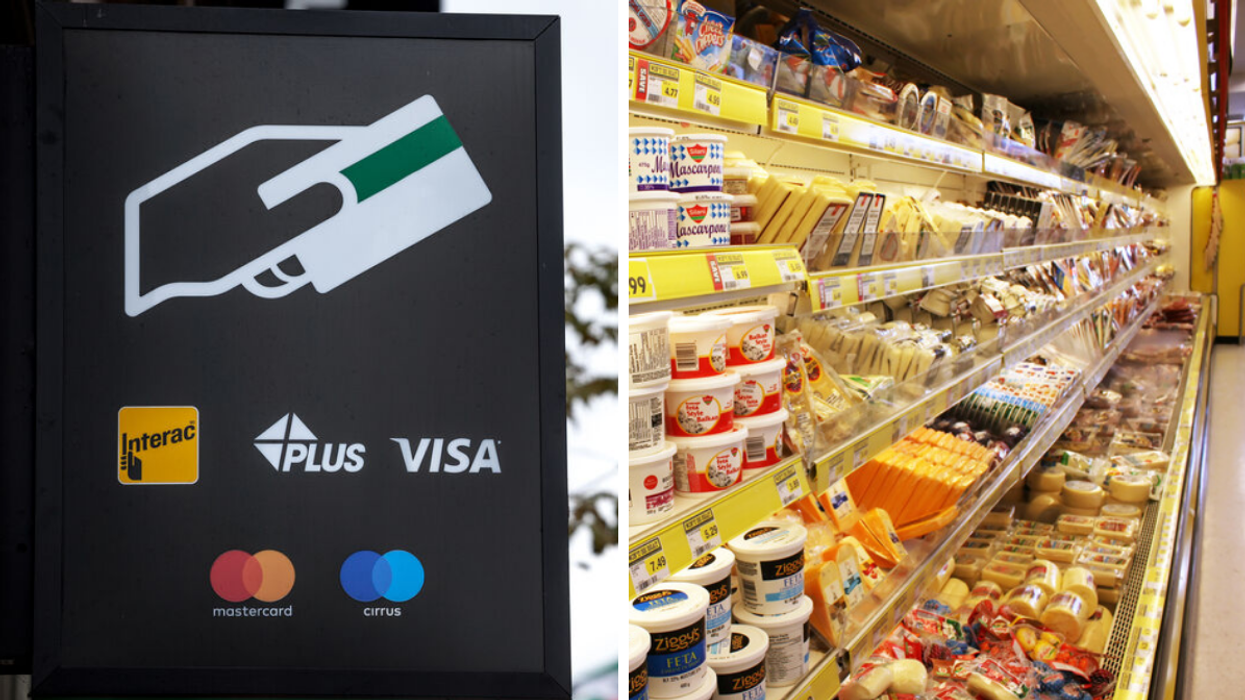7 Everyday Items That Cost Way More In Canada Than Other Parts Of The World
Seriously, why are groceries so expensive in Canada?

An ATM sign. Right: The dairy section in a grocery store.
Undoubtedly, the cost of living in Canada isn't something to be taken lightly.
Although the rate of inflation seems to be slowing down a bit, the latest Consumer Price Index revealed that the price of groceries has risen at an exponential rate.
And, it's not just grocery prices that are sky-high in Canada at the moment. Canadian consumers are paying more for gas, housing, cigarettes and more.
Here's a closer look at some of the everyday items that Canadians are forking out way more for, in comparison with people from other countries around the world.
Milk
The price of groceries as a whole has been increasing significantly in Canada, but the cost of milk here is among the highest in the world.
According to cost of living comparison website Numbeo, Canada ranks tenth globally when it comes to the price of milk, with a litre priced at around $2.61 on average.
According to the latest CPI report, the price of dairy has increased by 7% in comparison with 2021.
According to one study, Charlottetown, Moncton, St. John’s and Quebec City are some of the most expensive places to buy milk in Canada, with a four-litre bottle costing as much as $7.79 in Charlottetown this year. Yikes!
Chicken
The cost of meat is just another grocery list staple that has seen an incremental rise this year.
According to Numbeo, Canada ranks eighth on the list of most expensive chicken fillets globally, with 1kg setting Canadian customers back roughly $14.21.
That places it just behind countries like Switzerland, Iceland, Norway, and the U.S., among others.
According to the latest CPI, the price of meat in Canada has increased by 6.5% on a year-over-year basis. Ouch.
Cigarettes
There's bad news if you're a smoker in Canada, as this country has one of the highest costs when it comes to a packet of smokes.
According to Numbeo, a pack of Marlboro cigarettes can set you back $16 in Canada, making it the sixth most expensive country in the world for cigarettes after Australia, New Zealand, Ireland, the U.K. and Norway.
Housing
It's safe to say that Canada's housing market is going through a tumultuous time.
Numbeo says Canada ranks tenth when it comes to expensive countries to purchase a city apartment, with the cost being about $8,866 per square metre on average.
It's well above countries like the U.K., New Zealand and the United States, among others.
And, if you're thinking buying a place outside a city centre would be a better option, think again. Although it would set you back less at $6,489 per square metre, this is still among the most pricey globally.
Internet
Even our internet doesn't come cheap!
Canada is regularly counted among the countries with the highest internet costs and according to Numbeo, it ranks eighth worldwide.
It costs customers an average of $82.35 for internet, which is more than residents of many other countries are paying.
A 2021 report by telecom research company Rewheel also found that prices in the Canadian wireless market "continue to be the highest or among the highest in the world".
It noted several reasons for the high prices, including the lack of competition in the market.
Credit card fees
Canada actually has one of the highest interchange fees in the world.
This is the fee that a company has to pay to be able to accept a credit card transaction, which is then paid to the bank that issued the card.
In Canada, the average interchange fee is about 1.4%.
Although many countries have put a cap on this percentage, there is currently no cap in Canada.
Recently, thanks to a class action lawsuit, businesses have been allowed to pass on this surcharge to customers. However, there is a 2.4% cap set for surcharges that are passed onto customers.Insurance
According to a report from C.D Howe Institute, the premiums Canadians are paying for property and casualty insurance are on the higher side – at least when compared to other developed nations.
As reported by Financial Post, "Canada’s auto, property and liability gross written premiums from 2015 to 2018 amounted to 2.7 per cent of its GDP on average, compared to an OECD average of 1.6 per cent."
The study also noted that these premiums differed according to province. When it comes to car insurance, the provinces with the highest average premiums were B.C., Manitoba and Ontario.
So, not much luck if you're driving in one of these provinces!
This article's cover image was used for illustrative purposes only.